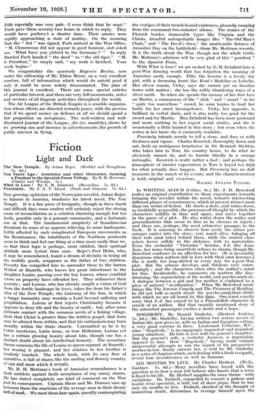Fiction
Light and Dark
Ten Years Ago : Armistice and other Memories, forming . a Pendant to the Spanish Farm Trilogy. By R. H. Mottram. (Chatto and Windus. 5s.) THE growing optimism of the Norwegian novelist, Johan Bojer, fathotiS in America, irradiates his latest novel, The New Temple. It is a fine piece of benignity, though in these harsh and difficult days some readers will certainly reject the closing scene of reconciliation as a solution charming enough but too facile, possible only-in- a peasant community, and a fortunate one at that. The fundamental simplicity of Scandinavian literature to some of us appears relieving, to some inadequate. Little affected by such complicated European movements as the Renaissance, the inhabitants of the Northern peninsula seem to think and feel one thing at a time more easily than we so that their logic is perhaps, more childish, their spiritual attitude more lyrical than ours. Bojer's Peer Helm, who, it may be remembered, found a dream of divinity in losing all his worldly goods, reappears as the father of two children. Poverty has compelled him to surrender these to the barren Widow at Busreth, who leaves her great inheritance to the daughter Louise, passing over the boy Lorenz, whose youthful views on property have offended her. They rediscover their
parents ; and Lorenz, who has already caught a vision of God from the fertile landscape he loves, takes fire from his father's idea of the New Temple, the Gateway of the Sun, in which a happy humanity may worship a Lord beyond suffering and propitiation. Lorenz at first rejects Christianity because it appears to deny life and the beauty of earth ; but, after some intimate contact with the common needs of a fishing village, finds that Christ is greater than the written gospel, that form may be altered from within, and that his enthusiasm may burn steadily within the State church. Untroubled as he is by Celtic mysticism, Latin irony, or true Hellenism, Lorenz yet
has a certain glowing beauty about him, though one has a distinct doubt about his intellectual honesty. The secondary theme concerns the life of Louise as queen-regnant at Busreth ; her wooing is piquant, and her relation to her brother is tenderly touched. The whole book, with its easy flow of narrative, is full of charm like the smiling and flowery country
of sUn and Snow which it reveals.
Mr. R. H. Mottram's book of Armistice remembrance is a
dark antidote against facile acceptance of any sunny charm. He has stated completely one kind of comment on the War and its consequence. Captain Skene and Mr. Dormer sum up between them the reactions of the average man in their dreary hell of mud. We meet them here-wain moodily contemplating _
the Vestiges of their trench-bound existences, gloomily escaping from the communal two-minutes' silence. The ironies of the Flemish border, immovable types like Virginia and the Chinks, dreadful unforgettable images like "The Old Man's Chair," and "The Devil's Own," the unutterable flatness of Armistice Day on the battlefield—these Mr. Mottram records. It is the truth about the War, though not the whole truth. Mr. Mottram's admirers will be very glad of this "pendant '! to the Spanish Farm.
With What is Love? we are rushed by E. M. Delafield into a post-War dancing world that has forgotten the meaning of Armistice easily enough. Ellie, the heroine is a lovely shy girl, with a dreaming heart like Keat's Madeline or Isabella. Her clever cousin, Vicky, says she cannot get on familiar terms with matter ; she has the softly blundering ways of .a silver moth. So when she spends the ecstasy of her first love on Martin, a connoisseur of the " slick " and " smart " in his "quite too marvellous" crowd, he soon begins to hurt her badly for her sweet incompetence. Vicky, her opposite, is brilliant in verbal duels, and is also really too good for the 'crowd and for Martin. Miss Delafield has been more profound and more scathing in her expert social studies, and she is occasionally a little hurried in this story ; but even when she writes in her haste she is eminently readable.
• Proximity intends merely to tell a story, and does so with freshness and vigour. Charles Kenwick, thoroughly down and out, finds an ambiguous benefactor in Sir Bernard Sheldon, who takes him to Tom, his country house, to do what he obviously cannot do, and to fumble blindly in a strange imbroglio. Kenwick is really rather a fool ; and perhaps the atmosphere of sinister expectation in Tom is keyed too high for what actually does happen. But Proximity has no dull moments in the march of its events, and the characterization is both original and vivacious.
RACHEL ANNAND TAYLOR.












































 Previous page
Previous page